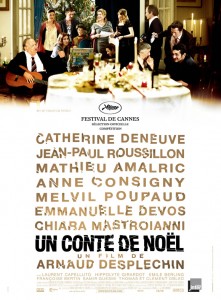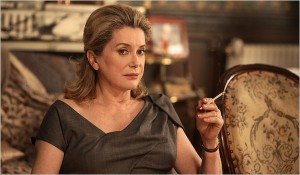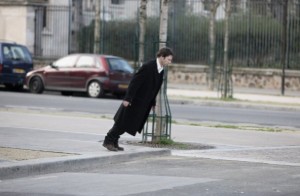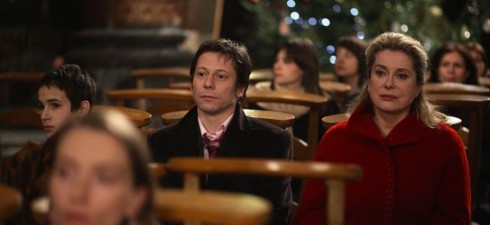” My son is dead. I looked inside myself and realized that I felt no grief. Suffering is a painted backdrop. Tears bring me no nearer to the world. My son fell from me like a leaf from a tree and I’ve lost nothing. Joseph is now my founder. This loss is my foundation. Joseph has made of me his son. And I feel boundless joy.”
-Abel Vuillard
 A Christmas Tale (Un Conte de Noël) is Arnaud Desplechin’s exuberant exploration of the joys, resentments and difficulties threaded through family relationships. Some films leave you with a feeling that you have experienced something solid and illuminating that will stay with you. A Christmas Tale (released in 2008), with its dream cast, rich characters and blend of humor and big ideas, is such a film for me. Every time I watch it, I like it more and I’m even more amazed by the strange alchemy Desplechin uses to create his moving, joyful, but unsentimental family drama.
A Christmas Tale (Un Conte de Noël) is Arnaud Desplechin’s exuberant exploration of the joys, resentments and difficulties threaded through family relationships. Some films leave you with a feeling that you have experienced something solid and illuminating that will stay with you. A Christmas Tale (released in 2008), with its dream cast, rich characters and blend of humor and big ideas, is such a film for me. Every time I watch it, I like it more and I’m even more amazed by the strange alchemy Desplechin uses to create his moving, joyful, but unsentimental family drama.
The film opens with a narrator revealing the family back-story as though it were in a children’s storybook: In the early 1960s, Abel and Junon Vuillard, give birth to two children, Joseph and Elizabeth. Joseph has a rare genetic condition, and only a bone marrow transplant can save him. But Abel and Junon, as well as Elizabeth, are incompatible. And so the couple conceive a third child, Henri — but his marrow doesn’t match either and Joseph dies 18 months later, at 6. The couple then have a fourth child, Ivan. As A Christmas Tale moves forward to the present day, we learn how each member of the Vuillard family has been shaped by that early loss.
Elizabeth (Anne Consigny) is a successful playwright, living in Paris. But for some reason — one that’s never really explained — her relationship with her brother Henri (Mathieu Amalric) has hardened into hatred. When Henri goes bankrupt as the result of a bad business deal and some bad behavior on his part, Elizabeth agrees to bail him out, on one condition: He is to have no more contact with her, ever.
The Vuillard family reluctantly goes along with this banishment, and Henri essentially disappears from their lives for six years. And then Junon (Catherine Deneuve) learns that she has a rare leukemia, the disease that took her firstborn son. And so she and her husband, Abel (the charming comic actor Jean-Paul Roussillon), look for a bone-marrow donor within the family as they all gather for the Christmas holiday.
Although the film continually circles back to the conflict between Henri and Elizabeth and Junon’s illness, the film is populated with a rich cast of supporting characters. There’s also Ivan (Melvil Poupaud), the youngest and most easy-going Vuillard, who’s married to Sylvia (Chiara Mastroianni, Deneuve’s real-life daughter); together, they have two sons. Simon (Laurent Capelluto), Junon’s nephew — the Vuillards took him in after the death of his own parents — is also part of the family core; he’s the one family member who has maintained contact with everyone, including Henri. Simon is also hopelessly in love with Sylvia. Finally, as Henri makes his reappearance within the family, he brings a girlfriend with him: Faunia (Emmanuelle Devos), who watches the tangled family events with detachment, a smile always playing on her lips.
Junon’s ruthless practicality and steely resilience has ensured the family’s success and survival, but left them fragile. Still, there is no question of the Vuillard’s affection for each other. In one of the film’s most telling scenes, Junon and Henri steal outside to share a smoke. Henri asks, “Still don’t love me?” to which she replies, “I never did,” the spikiness betraying a deep tenderness between them.
 Stylistically, Desplechin tries everything — characters talk to the camera as though they are being interviewed, another reads a letter out with a photographic backdrop behind them, the camera zooming in on the actor’s face, Junon’s cancer cells are seen dividing and spreading through her blood while ominous, melodramatic music plays in the background, music swells in and out mixing Charles Mingus with rap, we find ourselves in a Technicolor montage straight out of an MGM musical and then return to intimate vignettes of family life — Abel giving his grandsons a bath, the family enjoying fireworks in the garden — and naturalistic dialogue-laden scenes that would be at home in any Woody Allen movie.
Stylistically, Desplechin tries everything — characters talk to the camera as though they are being interviewed, another reads a letter out with a photographic backdrop behind them, the camera zooming in on the actor’s face, Junon’s cancer cells are seen dividing and spreading through her blood while ominous, melodramatic music plays in the background, music swells in and out mixing Charles Mingus with rap, we find ourselves in a Technicolor montage straight out of an MGM musical and then return to intimate vignettes of family life — Abel giving his grandsons a bath, the family enjoying fireworks in the garden — and naturalistic dialogue-laden scenes that would be at home in any Woody Allen movie.
At times, it feels that the movie will fly apart, scattered by the disparate elements that Desplechin employs. But the film, anchored by the brilliantly acted, richly drawn characters remains a cohesive whole, which feels like a miracle that the audience has been privileged to witness. The intricacy of Desplechin’s style reflects the complexity of family life in a way that mimics felt reality. All at once we feel the comfort, warmth and suffocation of spending the holidays together. We see Henri’s charm, but also the way he drives everyone crazy. We see both Elizabeth’s coldness and her fragility. Desplechin does not offer ‘lessons learned’ or catharsis, but the result is no less affirming. Instead he seems to be saying: This is life, in all of its messy imperfect glory: and it is just as it should be.
For a taste of Desplechin’s magic, view the trailer here.
NEXT WEEK: Heather is in full cinematic mode here, as she shares her interpretation of ‘The Visitor’ (2007). For a more extended schedule, check in here.

I’ve been helping teach a course on European cinema at the University this term, and it’s really helped me remember just how important French cinema (Godard, Truffaut and onwards) is to the warm, postmodern cinematic narrative that Hollywood adopts so often in the last twenty years or so. Thanks so much for sharing Desplechin with us, Heidi. You’re right – the film has a wonderful cast – capable of expressing a deep humanity that I find to be the most satisfying accomplishment of great cinema.
I started watching this on Netflix streaming the day after T-day and was really getting into it. But it was too much time away from the fam. I’m going back to finish it and will return and report. But Heidi, I can tell you that from what I’ve seen of the first 30 minutes, I love this flick. Thanks for offering it.
Will you kick me off the site if I confess that I can’t watch movies in other languages? (Cringe.) I have tried and I just can’t do it. I get so impatient with having to watch the subtitles and I just can’t focus.
Personal failing?
Heather, yes, personal failing. You are far too intelligent (and too much of a reader) for such an excuse.
Had this movie at my home via BlockbusterOnline for 2 months. Finally, the perfect night to watch the DVD came along and it was nowhere to be found… my wife had turned it in for some kids movie a few days prior. I’ll get it again over the holidays.
@Matt–guilty as charged. :(
So what do I have to do for penance?
@ Heather, usually I like to avoid piling on, but, in this case, I have to agree with Matt. Yes! Give them another chance, not because movies in other languages are like vegetables that you should force yourself to eat. Watch them because you’ll be missing out on so many amazing movies — Matt’s list is a great place to start.
@Matt, Please return and report after you’ve seen it. I’ll be interested to know what you think. And, I relate to not having enough time — I’ve had Crazy Heart for two months.
@Heidi–Ha! Hiding head in (well-deserved) shame. At least I knew I was treading on thin ice?? ;)
I printed out Matt’s list . . .
Watch 5 foreign films, then return and report. Hundreds, thousands of greats to choose from. Some suggestions:
French: Red, Jean de Florette, Manon des Sources, Amelie, Ridicule, La Femme Nikita, Betty Bleu, My Father’s Glory, My Mother’s Castle.
Chinese: Raise the Red Lantern, Eat Drink Man Woman, Ju Dou.
Italian: Cinema Paradiso, Il Postino.
German: The Lives of Others, Run Lola Run.
Spanish: Talk to Her, Pan’s Labyrinth, Open Your Eyes, All About My Mother, Belle Epoque.
Portuguese: City of God.
None of these are past masters (Fellini, Bergman, Godard, Truffaut, Di Sica, Kurosawa, etc.), but mostly recent or semi-recent movies that are fairly accessible to most moviegoers, but still great. Of course, I’ll think of a dozen more after I post this.
Sigh. Okay, Matt. I’ll take this challenge. If Andy reads this, he’ll probably try to get me to write a post for him about it. ;)
Spanish ones might not count because I speak Spanish . . .
I’ve seen Pan’s Labyrinth. Wowza.
And I watched the Diving Bell and the Butterfly. Does that count??
Gotcha Heather!
Pan’s Labyrinth or The Diving Bell and the Butterfly would be awesome… :)
I need to see The Diving Bell and the Butterfly. Coincidentally, I just saw Pan’s Labyrinth a few weeks ago!
Diving Bell is very good (I thought the visuals and acting were fantastic) and, coincidentally, stars Mathieu Amalric and Anne Consigny, who also star in A Christmas Tale.
I agree that ‘Diving Bell’ has amazing visuals… I love films that evoke an appreciation for the full pleasure possible through our senses.
Heidi, another plug for Filmspotting… They recently reviewed Desplechin’s “Kings and Queen.” As a fan, you should check it out:
http://www.filmspotting.net/reviews/629-after-hours-18-kings-and-queen.html
Made me want to see this one too.
I love Filmspotting, I’ll definitely check it out. And “Kings and Queen” is amazing, I like “A Christmas Tale” slightly more, but only for sentimental reasons. “Kings and Queen” might actually be the better movie.
Did you know Amalric has just directed a movie about burlesque dancers called “On Tour” http://www.guardian.co.uk/film/video/2010/dec/10/mathieu-amalric-on-tour?INTCMP=SRCH
Wonderful film — superb depiction of complex family dynamics. Terrific acting all around, with Jean-Paul Roussillon a standout as the patriarch. Do you know the name of the composition that serves as the soundtrack for the fireworks scene?
Citizen K, I agree — Roussillon is brilliant. I love Desplechin’s use of music in the film and I wish I could find the soundtrack. The fireworks scene is one of many gorgeous scenes.
BTW, my brother sent me these links for anyone interested on more reading about the film: http://www.filmschoolrejects.com/features/criterion-files-492-a-christmas-tale.php?utm_source=feedburner&utm_medium=feed&utm_campaign=Feed%3A+FilmSchoolRejects+%28Film+School+Rejects%29&utm_content=Yahoo%21+Mail
18. Fantastic work, I like the way you reach your reader. It touches my soul and mind simply because I really comprehend every detail you mention though for the reality it is complicated.